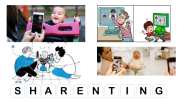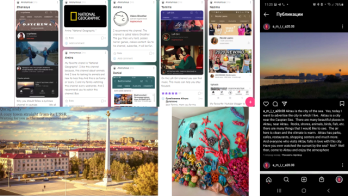Recent changes due to pandemic time and online work and study mode have led to rethinking of the role of technologies in teaching. Educators were forced to search for better ways of engaging students into learning. One of the most accessible tools was the use of blogging and social networks at the lessons, for extra classes and additional activities. Therefore, I, as a teacher of English, decided to develop a new course program for additional English lessons to improve their language skills outside the classroom.
В данной статье приводится опыт проведения серии дополнительных уроков по английскому языку для учащихся 7ых классов. Для создания программы занятий был проведен обзор литературы по имеющемуся опыту, связанному с социальными сетями и различными онлайн платформами. Далее приведены примеры заданий, использованных на занятиях, а также примеры работ учащихся. Более того, в конце приводятся идеи по интегрированию проведенных заданий в учебный план по английскому языку.
The first task was to review literature on research done on social networks, blogging and teachers’ experience in EFL and ESL classrooms. Currently every child knows who the blogger is, and almost everyone has their favorite bloggers, the decision was made to focus on bloggers and blogging in general. According to Cambridge Dictionary a blogger is someone who writes a blog (= a regular record of someone's ideas, opinions, or experiences that is put on the internet for other people to read). However, nowadays the blog is not only a written post on a personal blog, many people regard social networks as blogs too including Youtube, Instagram, Facebook and other platforms.
When choosing the content for the course the findings of researchers such as Tantarangsee, et.al. (2017), Okan & Taraf (2013), Lomicka & Lord (2016), Aydin (2014), Miftachudin (2017), Yunus et.al. (n.d.) and Banafi (2018) were of a great importance. Thus, Tantarangsee, et.al. (2017) identified the most widely-used social media platforms and the functions achieved in social media-based activities in teaching and learning. They also regarded current generation as “Texting generation” because young people excessively love texting messages to one another anywhere and anytime, as a result web application or programs ae gaining popularity since there every user can retrieve information in the form of texts, pictures, and video clips and connect to one another on web pages sharing own thoughts, videos and images as well. It was also mentioned in Banafis study (2018) that “the new generation of learners are not content to be passive consumers”, but they are willing to design, produce, and distribute products themselves.
As it was mentioned above social media-based activities are widely used by many teachers to motivate students, increase their curiosity, make their writing skills better by reading and writing own posts (Okan&Taraf (2013), Tantarangasee (2017)). Since my subject is English for students to whom it is not a native language, social media is crucial because one of the most common languages used on the Internet including social media is English language. Therefore, researchers assumed that students use some English while surfing the net and because of the joy and social influence they gain there, they probably learn or at least practice reading, listening and writing skills in English. Thus, social media-based tasks bring some authentic context to classroom settings.
As well as benefits one must take into consideration some issues related to turning students into some sort of bloggers. Thus, a study conducted by Kavaliauskiene & Vaiciuniene (2006) indicated that students can be concerned mostly about the beauty of the blog rather than improving their writing skills. Another important issue is self-confidence. Students are not always willing to share their thoughts and opinions with others. Therefore, for the young bloggers online summer course platforms which were familiar to students were used. If students did not want to share their posts with others they could hide it from others, but they had to send screenshots to other participants of the course and to the teacher. Another important rule that was applied into lessons was to give feedback to every student. Before giving feedback we were discussing what the feedback is and what we are allowed to write and what should be avoided.
Another important finding was identified by Lomicka & Lord (2016) who states that more academic studies are related to various social media tools, however, most of them are “not empirically based, nor do they offer strong theoretical advances” (p.2). Therefore, many tasks in the course were chosen intuitively and feedback of participants of that course was collected to know what participants felt after completing the course and what educational insights they obtained.
After reviewing an existing body of literature on using social media-based activities in teaching and learning the development of the summer school program started. Before choosing the topic the learning objectives for the course were identified. For example, they were aimed at improving pronunciation, deducing the meaning of words from the context, interacting with peers, and writing independently posts on a wide range of topics.
There were 10 main topics that were selected for the course: Dive into blogging, different bloggers, Why blogging?, Sharenting, Ethical considerations of blogging, Worth a thousand words, food, travel (Advertise your city), places (Video storytelling), History (Monuments). The final project was to create a project about the beauty of their native city.
From the beginning of the course students were aware of the program requirements and expectations. The participants of the course were students of 7 th grade and the language of instruction was English. However, every unit can be easily modified so that it meets the variety of CEFR levels. The platform that we employed for lessons was Microsoft Teams. But it can easily be changed into any other online platform. Moreover, the content of the program can have an offline mode. Our lessons were mainly organized in the following way: the first lesson was for input session, the second lesson was for pair and group work, and the third lesson was mostly for individual practice. At the end of each day we met and reflected on what we had learned and done. Students could also suggest some topics and activities for the following day.



It can be noticed most task formats were familiar to students, but the content was aimed at developing students’ skills, practicing grammar and enriching vocabulary. Students were writing posts, making infographics, they learned about targeted advertisements, and expressed their opinion on sharenting. Students created postcards, shared their favorite bloggers and youtubers on Padlet, they learned how to take beautiful images and they found out about the dangers of revealing personal information online. Students compared and contrasted videos of different travel bloggers, they were creating travel routes for unusual places like Uganda and Madagaskar using real websites. There was even an interview with an international teacher who answered 73 questions of students as in one popular Youtube channel created by Vogue. During this course several grammar topics were covered: 9 Tenses, modal verbs, Gerunds and Infinitives, Degrees of Comparison, adverbs of frequency and the sentence structure.
As a final outcome of the course I had decided to help students see the beauty of their place of living. Since there are many restrictions related to pandemic time, people have not been travelling actively lately. Most people complain that their cities are not interesting, there is nothing to do. It is a destructive opinion. I wanted my students to focus on positive moments. Therefore, the final task was to use storytelling techniques and present one person, or one event, or one place that makes their city (place of living) unique.
There are some examples of students’ work during this summer course for young bloggers:

These topics and activities can be employed not only for extra lessons, but they are suitable for any lesson and any level. Based on students’ feedback the use of social media at the lessons helped them see the real audience and not to be afraid using English outside school settings. Additionally, students did not expect having so much fun at extra lessons.
References:
- Aydin, S. (2014). The Use of Blogs in Learning English as a Foreign Language. Mevlana International Journal of Education, 4(1), 244–259. https://doi.org/10.13054/mije.13.79.4.1
- Banafi N. H. (2016). Explore Ways of Using Social Media Platforms in Teaching English Language: Literature Review. International Conference ICT for Language Learning. Published.
- Lomicka L. & Lord G. (2016). Social Networking and Language Learning. The Routledge Handbook of Language Learning and Technology. Published.
- Miftachudin, M. (2017). Students’ Perceptions of the Use of Blogs in English Language Learning. Register Journal, 10(1), 101. https://doi.org/10.18326/rgt.v10i1.878
- Okan, Z., & Taraf, H. U. (2013). The Use of Blogs in Second Language Teacher Education. Procedia — Social and Behavioral Sciences, 83, 282–289. https://doi.org/10.1016/j.sbspro.2013.06.055
- Tantarangsee, C. (2017). The Use of Social Media in Teaching and Learning: A Case of SSRU’s Faculty Members. International Journal of Innovation, Management and Technology, 471–476. https://doi.org/10.18178/ijimt.2017.8.6.773
- Yunus M., Kiing Tuan J. & Salehi H. (2013). Using Blogs to Promote Writing Skill in ESL Classroom. Recent Advances in Educational Technologies, 109–113.







